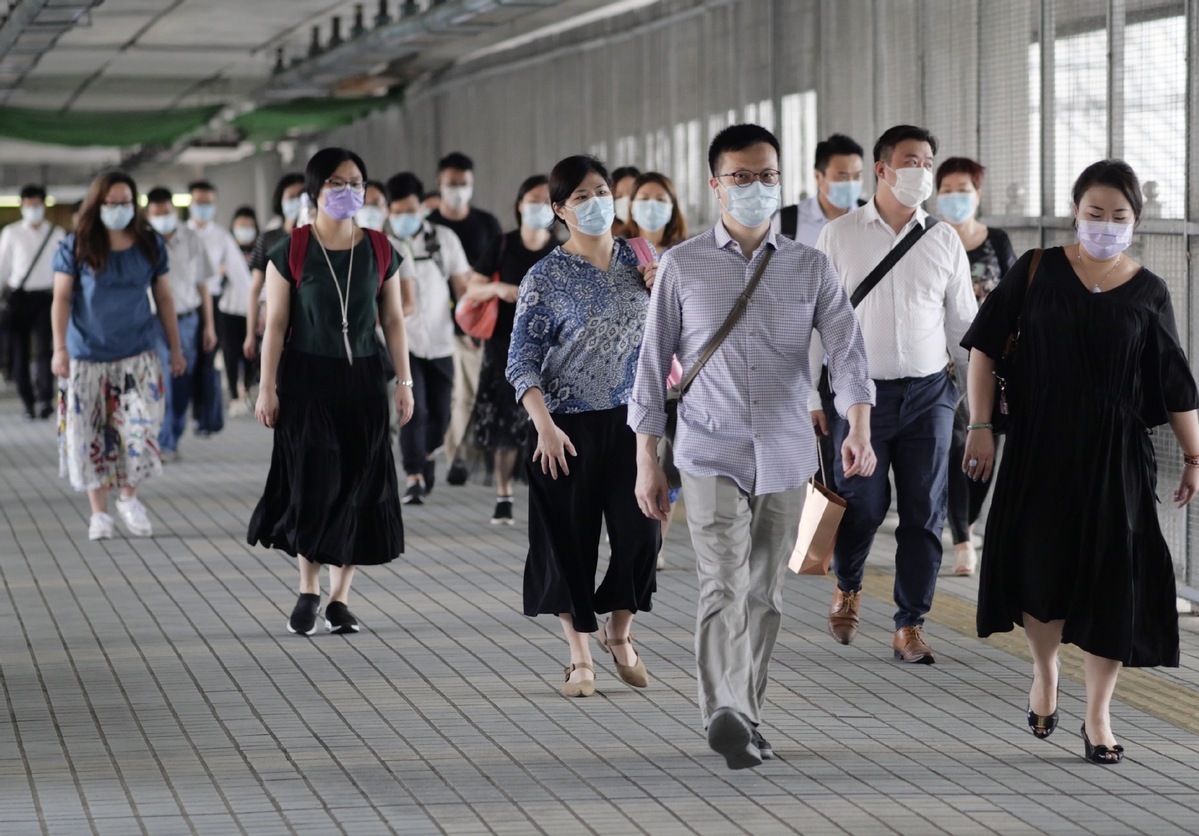
People wearing masks walk out of a metro station in Hong Kong Special Administrative Region of China on Aug 13, 2020. (Photo: Xinhua)
Hong Kong needs to brace itself for another coronavirus outbreak in winter by learning from mistakes made before and during the yet-to-be-controlled third wave of COVID-19 infections, a top local microbiologist said.
The third wave has taught us that stringent border controls, rules in mask-off settings like restaurants, and adequate testing capacity are three things the city should continue to push ahead with before the next local outbreak, said Yuen Kwok-yung, chair professor of the Department of Microbiology at the University of Hong Kong.
During an interview with China Daily on Tuesday, Yuen said an outbreak in winter, when holiday travel is at its peak, is inevitable in such an open economy, while its severity depends on whether the city can adhere to those three aspects.
Another safeguard against future outbreaks is sufficient quarantine and treatment facilities, he added, referring to two temporary facilities with a total of 1,800 beds that Chinese mainland authorities are helping to build on Lantau Island.
The 63-year-old doctor suggested Hong Kong people get into the habit of using their cellphones to record where they have been and the transport they have used, to help with contact tracing.
Hong Kong reported 24 new COVID-19 cases on Wednesday — all locally transmitted cases and 10 of unclear origin — one of the lowest daily totals during the third wave.
But Yuen cautioned that the third wave has not yet been tamed, because multiple untraceable cases every day indicate that unknown transmission chains in the community still exist.
"In a few weeks' time, the third wave is going away. But don't be complacent. It could come back very easily if all these countermeasures against critical control points are not being instituted."
A citywide free coronavirus testing program, meant to find asymptomatic patients, will start from Tuesday, with online registration open on Saturday.
Yuen said he supports the testing program, which he believes can alleviate the anxiety of people who want to be tested for fear of exposure, although people would have been more enthusiastic about testing if the program had been introduced when daily cases were at their peak.
The free testing, he added, is also a move to reassure mainland cities and neighboring countries and regions that the Hong Kong government is doing its best to ensure the city is relatively free of COVID-19, so that travel restrictions may be loosened more easily.
In addition to isolating silent carriers left in the community, the results of the citywide testing will be of great value to further research, Yuen said.
"(The testing) is to find risk factors, (such as) which geographic location has a higher number of silent carriers? Why are they located there? What are their ages and genders? Where are they working? What are the occupations at risk?" he said.
After understanding the answers to all these questions, health experts can figure out what should be done in the winter to prevent high-risk groups from getting infected, he continued.
The mainland has been handling the pandemic "extremely well" overall after acknowledging mistakes it had made at the outset, said Yuen, who also co-directs the HKU's State Key Laboratory of Emerging Infectious Diseases.
The key to the mainland's success lies in its ability to mobilize healthcare workers and immobilize potentially infected people very efficiently, he noted. The massive testing and efficient contact tracing afterward ensure that any resurgence in the outbreak can be reined in.
The Chinese mainland has done much better than many developed countries in terms of caseload, death rate and economic recovery. Unfortunately, those countries have failed to learn from its experience, Yuen said.
There is an obvious bias from the West, he added. "In fact, this bias led to their failures to control their own pandemic problems."


